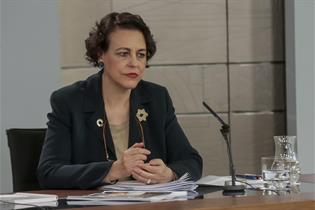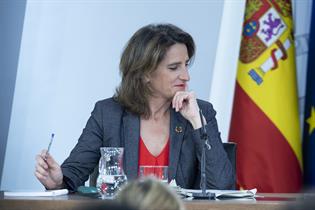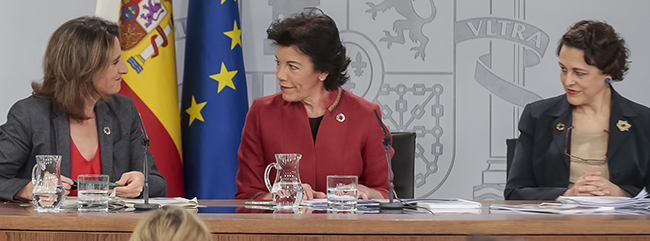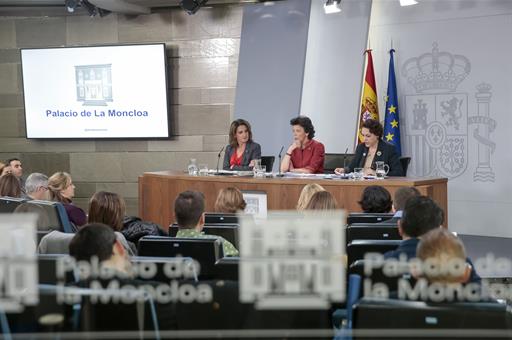Council of Ministers
Government approves Plan to Combat Long-term Unemployment
Council of Ministers - 2019.4.5
The Council of Ministers approved the "Reincorpora-t" Plan to improve the employability of the long-term unemployed, to be developed over the next three years (2019-2021) with a budget of 1.31 billion euros.
The Minister for Work, Migration and Social Security, Magdalena Valerio, defined the goals set out under the Plan as "ambitious", which include reducing the current rate of long-term unemployment, which is double the EU average, from 6.8% to 4.3%. In absolute terms, the aim is to reduce the number of long-term unemployed, which according to the Labour Force Survey, stands at 1.5 million, to 1 million, particularly among those over the age of 30.
Magdalena Valerio considers that the Plan is not only important quantitatively, but also socially, because in addition to being unemployed, those affected also have "elements of individual and social vulnerability", which may lead to "personal and family poverty, and to exclusion". Among those groups with the greatest difficulties, the minister mentioned women, those over the age of 45 and those people with some form of disability, as well as the unemployed in the rural environment.
The Plan contains 63 measures to promote specific actions to enhance the employability of these people and on prevention to avoid the loss of work turning into a situation of long-term unemployment.
 Pool Moncloa/JM CuadradoThe minister explained that these measures will have an impact on personalised preparation for reinsertion into the job market in collaboration with social services. Furthermore, the unemployed may choose a guidance counsellor to advise them on re-training and the professional qualifications they may need and to help them look for a new job.
Pool Moncloa/JM CuadradoThe minister explained that these measures will have an impact on personalised preparation for reinsertion into the job market in collaboration with social services. Furthermore, the unemployed may choose a guidance counsellor to advise them on re-training and the professional qualifications they may need and to help them look for a new job.
Several ministerial departments were involved in drafting the Plan, together with regional government departments, local authorities, business organisations, trade unions and third sector, social economy and self-employment organisations. Magdalena Valero explained that its development will also be participative since the document ties in all public authorities with private enterprise. "It is very important for them to be committed to undertaking an exercise in social responsibility by hiring the long-term unemployed because this is good for the country's economy and for individuals, in other words, it is doubly good".
Lastly, Magdalena Valerio pointed out that in addition to the financing allocated for the "Reincorpora-t" Plan, there are another 2.69 billion euros allocated to two other measures already in force - the recovery of the subsidy for the unemployed over the age of 52 contained in Royal Decree-Law 8/2019, of 8 March, and the contributions of professional and non-professionals carers under the Long-term Care Act, regulated by Royal Decree-Law 6/2019, of 1 March.
National Strategy to Combat Energy Poverty
The government approved the National Strategy to Combat Energy Poverty 2019-2024, which offers, for the first time, an official definition of this situation and seeks to reduce the number of people affected by at least 25% by the year 2025.
The Minister for the Ecological Transition, Teresa Ribera, explained that energy poverty is the situation in which a household may find itself if it cannot satisfy its basic energy supply needs as a result of a level of insufficient income and which, as the case may be, is exacerbated by living in an energy inefficient home.
The Strategy establishes four indicators, outlined the minister.
Disproportionate spending is associated with those households (8.1 million people) where energy spending in relation to income is more than double the national average. Hidden energy poverty affects 5.1 million people, whose absolute energy spending is less than the national average as they are unable to consume energy to guarantee a minimum level of comfort because they do not have the money to afford that. There are an additional 3.7 million citizens that cannot maintain their home at an adequate temperature and 3.5 million who are behind in paying their electricity bills.
Taking these figures into account, Teresa Ribera claimed that the government aims to reduce the number of people affected by these indicators by at least 25%, with an ultimate goal of 50%, by the year 2025. Four main areas of action, with 19 specific actions have been established to this end.
 Pool Moncloa/Borja Puig de la BellacasaAmong these, the minister highlighted that the diagnosis of vulnerable homes will be improved, and a new electricity voucher will be created that is universal for all forms of supply, both thermal and electric. This will be automated through collaboration between public authorities, and the criteria of income, the situation of recipients and the climate in the place the dwelling is located will be taken into account as basic principles.
Pool Moncloa/Borja Puig de la BellacasaAmong these, the minister highlighted that the diagnosis of vulnerable homes will be improved, and a new electricity voucher will be created that is universal for all forms of supply, both thermal and electric. This will be automated through collaboration between public authorities, and the criteria of income, the situation of recipients and the climate in the place the dwelling is located will be taken into account as basic principles.
The Strategy bans cutting off the supply in extreme climate situations and extends the period of supply in the event of payment default by another four months to a total of eight months. Another of the pillars focuses on improving the insulation of properties and boosting the refurbishment of buildings. The Strategy also provides for the adoption of measures to inform and protect consumers and avoid them ending up in a situation of energy poverty.
Electricity self-consumption
On the matter of energy, the Council of Ministers also approved the Royal Decree-Law regulating the administrative, technical and economic conditions of self-consumption in Spain. This new legislation completes the regulatory framework on this matter after the repeal of the so-called Sun Tax.
The minister argued that self-consumption has "tremendously positive effects" on price trends and on the development from an energy system that is "highly centralised, complex, costly and reserved for the privileged few" towards a system of working in a network whereby stakeholders respond to supply and demand. Facilitating self-consumption, she said, generates economic activity, local jobs, facilitates solutions at a better price for rural communities and fosters the transition towards a full carbon-neutral economy.
The legislation adopted on Friday establishes the figure of "collective self-consumption". The minister pointed out that this facilitates self-consumers joining up to the same generation plant, thus boosting self-consumption in owner's associations, or among companies and industries with premises in the same location. It also allows for the installation of photovoltaic panels on adjacent buildings with a better orientation provided there is agreement between the different owners, an issue that had not been regulated to date.
Teresa Ribera added that the Royal Decree establishes two forms of self-consumers, those who intend to supply the network with the surplus they produce but do not consume, and those that do not intend to do so. In the first case, the reference energy supplier will remunerate the user by offsetting the excess energy in each monthly bill.
The minister clarified that this remuneration may even amount to 100% of the energy consumed by the user during the month. "There is no exchange of money since there is no remuneration payable in excess of the network consumption".
This measure reduces the administrative paperwork for users. In the case of small self-consumers (installations of up to 15 kilowatts or 100 kilowatts for self-consumption with no surplus), paperwork is limited to the notification of the installation of an electricity production plant to the corresponding autonomous region or city authorities.
Subsidies for acquisition of scientific equipment
 Pool Moncloa/JM CuadradoThe government approved the annual round of proposals for the acquisition of scientific-technical equipment, within the framework of the State Scientific and Technical Research and Innovation Plan 2017-2020. The amount allocated to financing these subsidies stands at 187 million euros.
Pool Moncloa/JM CuadradoThe government approved the annual round of proposals for the acquisition of scientific-technical equipment, within the framework of the State Scientific and Technical Research and Innovation Plan 2017-2020. The amount allocated to financing these subsidies stands at 187 million euros.
The Minister for Education and Vocational Training, and Government Spokesperson, Isabel Celaá, explained that priority will be given to applications for next generation scientific-technical equipment "in order to perform high-quality, up-to-date research that is highly competitive".
Public research bodies, public universities, university institutes and other public R&D centres attached to Central Government or regional public authorities may apply under this round of proposals.
Maritime tourism
The government approved two Royal Decrees to, firstly, update the regulation of nautical qualifications for recreational vessels and on the safety of jet skis and, secondly, establish rules that allow fishing vessels to take tourists on-board with all due guarantees who wish to see how they carry on their activity.
Isabel Celaá pointed out that the aim of the new legislation is "to foster an alliance between tourism and the maritime sector", which are defined as two important economic activities in our country.
"Sexenni de Morella", intangible cultural heritage
The government has declared the "Sexenni de Morella Festival" as a Representative Manifestation of Intangible Cultural Heritage. This festival back to the 17th Century and has been held every six years ever since in the town of Castellon.
Isabel Celaá explained its importance due to the survival of the rituals and cultural expressions contained in the festival, which have now disappeared in other parts of Spain.
Brexit: new consulate in Manchester
 Pool Moncloa/J.M. Cuadrado
Pool Moncloa/J.M. Cuadrado
The Council of Ministers approved the opening, eight years after its closure, of a Spanish consular office, with the status of Consulate-General, in the British city of Manchester.
Isabel Celaá justified the measure as a result of the exponential growth of Spanish residents in the United Kingdom, and because of the imminence of Brexit, which makes it necessary "to strengthen consular presence to offer legal certainty to Spaniards and assist them with such bureaucratic needs and information as they may require".
Against the backdrop of Brexit, the European Parliament has approved a new visa regulation this week in which, for the first time, the European institution has recognised the status of Gibraltar as a colony. The Government Spokesperson described this classification as a "State success" which, she said, "represents a great step forward for our country's claims".
Weekly affairs
In her balance of the week's affairs, Isabel Celaá regretted the new cases of male violence recorded and called for unity to bring to a halt "this rise in dramatic deaths which require that we do not look the other way".
The Government Spokesperson also referred to the ratification, by the Standing Committee in the Lower House of Parliament, of six Royal Decree-Laws approved by the Council of Ministers in recent weeks. Isabel Celaá stressed the "absolute normality" of this procedure, and stated that it has been employed on 39 occasions during electoral period in the democratic history of our country.
Non official translation





